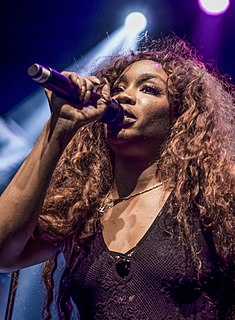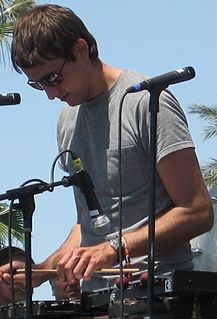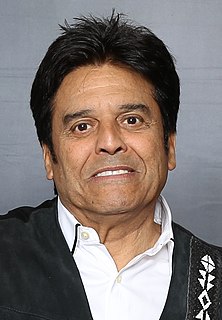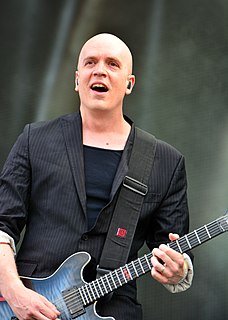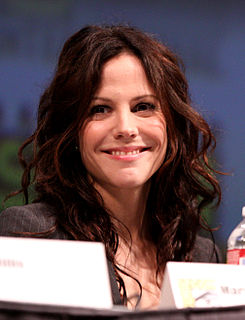A Quote by SZA
When your parents regulate everything you hear and everything you intake, it forces you to get creative in other ways. It sparked the writing bug and the very overactive imagination. Because I've had a lot of time by myself and a lot of time isolated from regular culture, I created my own.
Related Quotes
What I think is important about essayists, about the essay as opposed to a lot of personal writing is that the material has to be presented in a processed way. I'm just not interested in writing, "Hey, this is what happened to me today." You get to a place that has very little to do with your personal experience and talks about some larger idea or something in the culture. I don't think you can get to that unless you have had a lot of time to gestate and maybe if I was taking a lot of notes while stuff was going on, I wouldn't be able to get to that place as easily.
There are people a lot smarter than me investigating nature versus nurture who would have a lot to say about that, but I think it's an enormous privilege to be born into a family where my parents had enough time to read to me and listen to my stories and foster my imagination. It's a privilege to have time to investigate your imagination. And not to have, like, an amount of stress on you as a kid that prevents you from maturing creatively.
This happens to a lot of kids from different backgrounds - they lose a lot of their parents' and grandparents' teachings, language and culture because they have to deal with another language and culture 24/7. By the time I was 44, I was terrible at Spanish. I was always intimidated whenever I had to speak it.
In Strapping, I had experimented with a creative catharsis under the assumption that art doesn't need to be accountable for itself, but I found out in very practical ways that you are accountable for everything you say. Everything you write, everything you do becomes not only your identity but your world resonates with it.
I didn't grow up in a creative environment. It was very boring town, boring everything. You go to school and you basically hate all the other kids because you don't understand them or what it's all about. At the same time I'm happy for that because I became very withdrawn and when you become withdrawn you develop your own bizarre-o personality.
Everything is deeply affected by the dominant culture. Consumerism is huge in the US. This is by far the wealthiest [nation], but also the biggest consumer in the world. Which means that a lot of things get used, a lot of things get wasted, and a lot of things get churned out in ways that are wasteful.
I think we waste a lot of time trying to convince other people that we're right. A lot of times we don't actually care what another person thinks, we just want to say what we think. To hear it reflected back to us and that we're okay, to hear that we have been understood and that we're correct - so that we can continue to be who we are in the ways we've been being, and we have nothing to feel bad about and everything is just fine. Even if what we're talking about is, like, police brutality.
For younger athletes - women, especially, if it's a male-dominated sport - I'd say be very careful to just be true to yourself. I spent a lot of time trying to emulate how a male wrestler was. They're tough, they're very confident, they don't show a lot of emotion, and they push through everything. That's not me at all. I'm a wrestler but I have emotions, I'm sensitive. When I stopped trying to be something that I wasn't, I felt like I was freeing myself up to find ways to make it work for myself.
Anyone who's taken a lot of creative-writing classes, or taught creative writing, has learned to dread a certain kind of manuscript. It's long, for one thing. It has irritatingly small type; it's grammatically meticulous when it comes to everything but punctuation, for which it has developed its own system of Tolkienic elaboration.
There's a lot of time sitting in movies, so you can put alligators in people's trailers in your spare time. So it [making a film] moves slower, which in some ways is great, because you can live with a scene and invest in it a lot. And in some ways it's hard, because sometimes you can start to lose your energy a little bit, but both are fun.
My childhood was bittersweet in many ways. We moved around a lot. By the time I was 10, I had travelled thousands of miles, often on my own. My parents were like my friends, so it felt like I didn't really have parents at all. But in a crazy way that was very liberating. It forced me to be independent, maybe a leader, and certainly a survivor.
My father probably taught me everything I know, aside from dialogue, which I think I get from my mom a lot more. He certainly didn't teach me everything he knew, but you know he has got this book out called "The Spooky Art," which is essentially an advanced book on writing and it's not... You know it's not ABC, but it's for people who feel that bug and know that they're writers and are willing to put in that time alone. Pretty much the vast majority of what he taught me you can find in that book.
